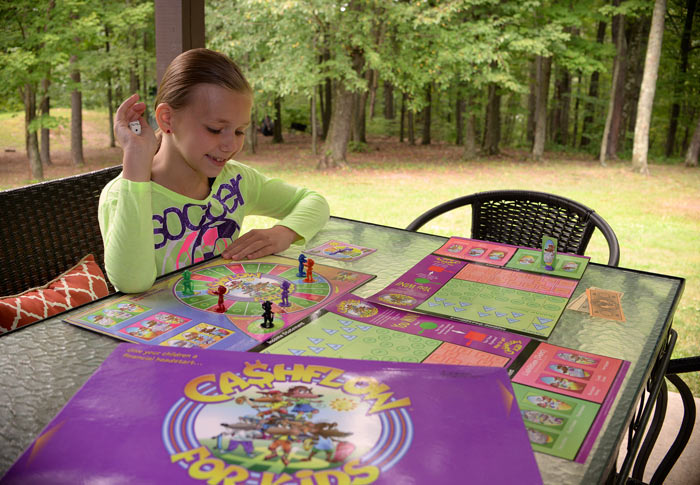4 ways to keep your kids from mooching off you forever
As parents (or grandparents), we spend a lot of time teaching kids good manners, how to be safe, and how to act appropriately in public. But often we neglect one of the most important lessons – preparing them to be financially responsible.
Statistics show that kids aren’t learning much about personal finance in school. That means, if we’re not teaching them about money, there may be no place in their world where financial education takes place. As a result, they will likely enter adulthood with very little awareness of what dollars and cents really mean.
Below are four ways we can teach children about money and set our little ones on a path of future financial success and prosperity.
1. Model good money behavior. Kids are more likely to do what you do than do what you say. Make sure you’re showcasing healthy financial philosophies and behaviors in your own life. Also, be honest and transparent about your financial situation, including the mistakes and successes you’ve had with money and how you’re working to reduce debt and increase saving and giving. Don’t brush off questions about money or pretend it’s not important. Instill in your children from an early age that handling money in a smart and generous way is one of the most important aspects of a successful life.

(Our daughter loves playing “Cash Flow for Kids“* with us. It’s a fun game, created by the author of “Rich Dad, Poor Dad,” that teaches the basics of earning and spending, assets and liabilities. The other day, as I was buying something online, Eva said, “Mom, you know that’s a liability, right? We should try to build assets instead.”) 😉
2. Avoid the phrase, “We can’t afford it.” This may cause children to worry that the family is struggling financially. Instead, consider saying, “We choose not to spend our money that way.” Even better, consider asking, “How can we afford it?” This encourages critical thinking and problem-solving skills, expanding childrens’ understanding of how value and wealth are created. It also teaches that we do, indeed, have a great deal of control over our ultimate financial destiny.
3. Involve kids in household shopping. Take them to the store and let them hold your list or coupons. This is a great chance to talk about planning, saving and finding the best value. Don’t, however, overexpose children to shopping. Shopping as simply a leisure activity encourages materialism and impulse buying.
4. Consider an allowance but never a loan. An allowance can help children learn how to handle money on their own. Experts recommend starting at age 6 with a weekly amount and then spacing out the timing as children get older. You can use it as a way to teach short- and long-term saving as well as good spending habits and giving philosophies. Resist the urge to give kids a loan. It’s important they make choices and then live with the consequences. If they spent their month’s allowance in the first week, too bad. By experiencing a negative consequence firsthand, they’ll learn to make smarter choices.
“Instruct those who are rich in this present world not to be conceited or to fix their hope on the uncertainty of riches, but on God, who richly supplies us with all things to enjoy. Instruct them to do good, to be rich in good works, to be generous and ready to share, storing up for themselves the treasure of a good foundation for the future, so that they may take hold of that which is life indeed.” – 1 Tim. 6:17-19
Do you feel you’ve done a good job teaching your kids or grand kids about money? What challenges have you faced in this area?
* Affiliate links provided for your convenience







This is a topic that hits close to home!! We have two sons. The oldest is on his own, fully supporting his two sons and paying his child support and bills on time. The youngest, on the other hand, is always at least a month behind on his car payment and won’t even acknowledge his other debts. We have tried to discuss finances with him for many years to no avail. Not sure how one picked up on what we were teaching and the other didn’t. It breaks my heart that a 25 year old cannot even maintain a checking account. We have even tried to help him with his but he kept forgetting to bring us receipts and still overspends every week.
I wish he would “get it” but not holding out any hope for that! UGH!
That sounds so frustrating, Barbara. My thoughts and prayers go out to you and your son. He needs a one-on-one counseling session with Dave Ramsey, lol.
Great post Susan. We can ALL learn from this!
Absolutely! 🙂
This has been a sore spot with me for some time. Why not teach these kids something they will all have a need for no matter what kind of work they go into, like balancing a checkbook. I can’t believe how many kids come out of school get a job a checking account and don’t even know how to balance the check book and if they have a debit card that is a disaster, for some reason they don’t think they need to write those down in the register.
Several years ago a good friend of mine had a friend whose child was in a school and one of the teachers there was teaching the kids how to budget money. every week they got a paycheck and took it to the bank, they put some in savings and most in checking, they paid their rent utilities, car payments and bought grocery’s and on Friday they balanced their checking accounts. The children loved it and learned well they would even go home and teach their parents. I truly believe this is what our schools need. This teacher was so good made it fun and they learned.
I totally agree, Patty. Thanks for the great feedback and for stopping by.